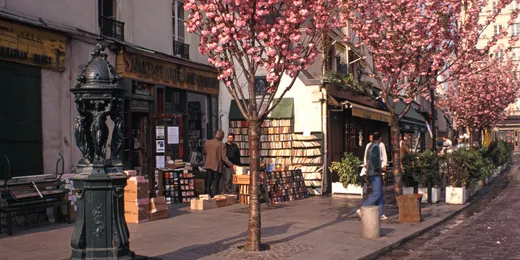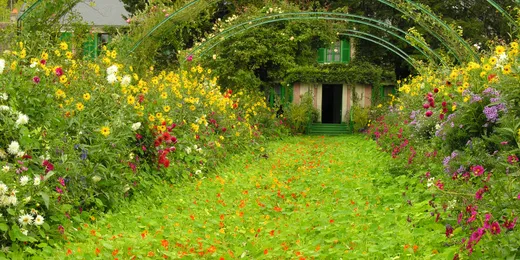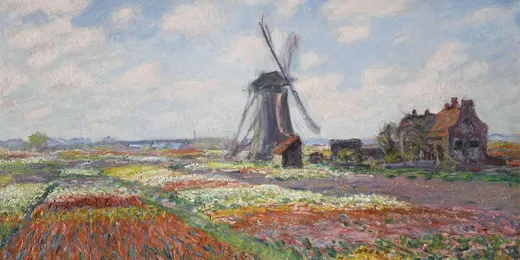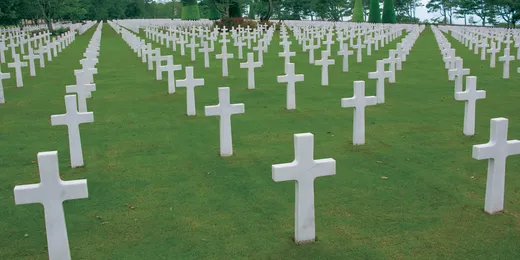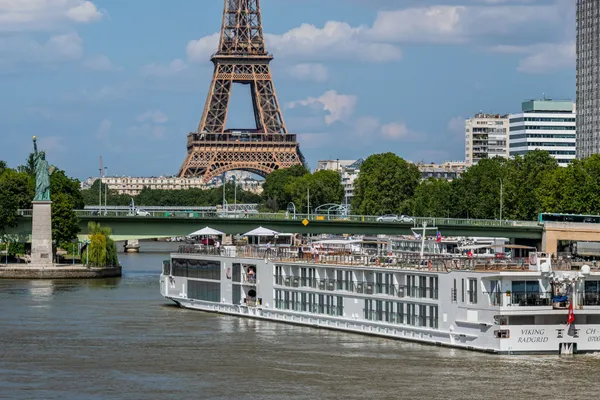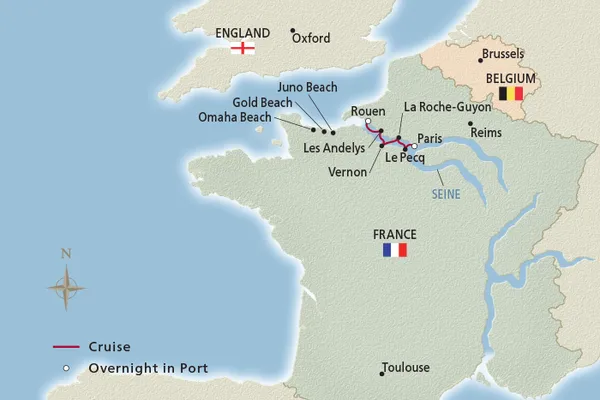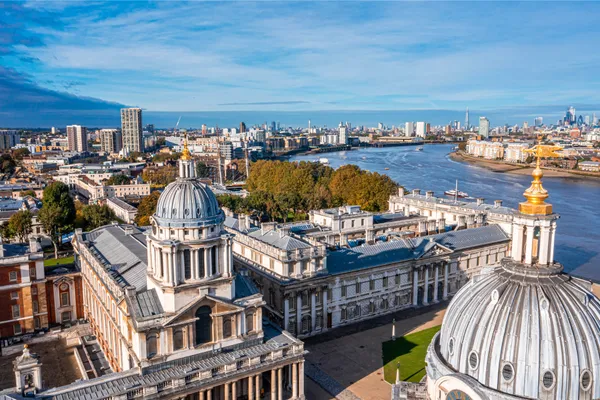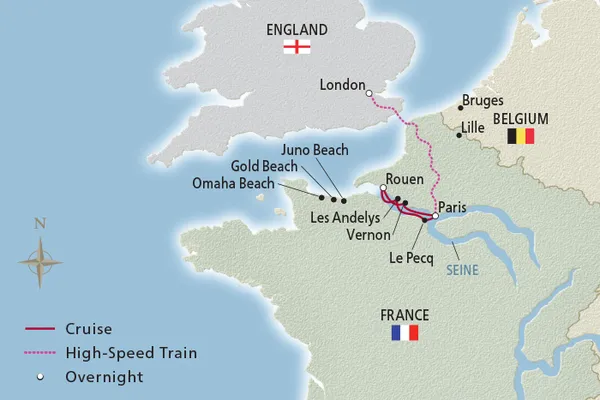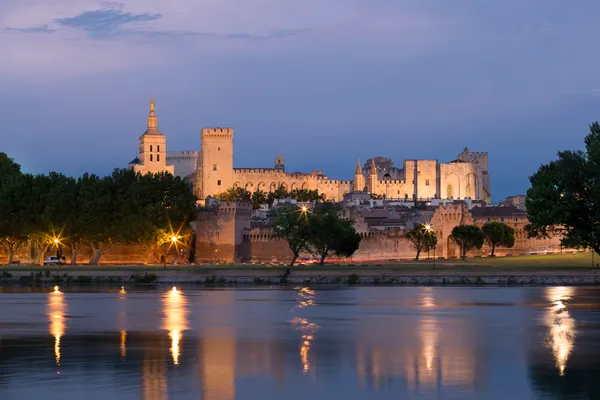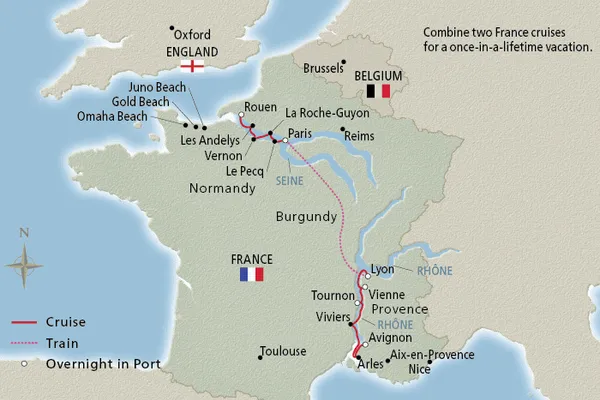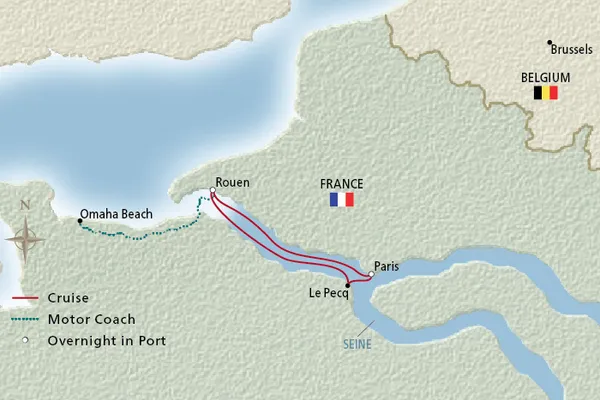
Embark on a voyage along the Seine River
Immerse yourself in the captivating history, rich culture and charming scenery of France. This captivating region offers ample opportunities for discovery, from the bustling streets of Paris to the bucolic orchards of Normandy. Read on to learn more about one of France’s most famous dishes, delve into the life of the artist Claude Monet and trace the origins of the opulent Palace of Versailles.

Seine
The Seine, France’s second-longest river, stretches 482 mi. (776 km). It begins just outside Dijon in the Burgundy region and flows northwest through Troyes and into Paris. The river divides this renowned capital city into the Right Bank and the Left Bank. Some of the most iconic Left Bank landmarks include the Eiffel Tower and the Musée d’Orsay, while the Right Bank is home to the Louvre Museum and Montmartre’s Sacré-Coeur Basilica. Beyond Paris, the Seine makes its way through the city of Rouen before emptying into the English Channel at Le Havre.
As France’s busiest inland waterway, the river plays a vital commercial role in the Île-de-France and Haute-Normandie regions. A vast network of canals also connects the Seine with the Rhône River, the Loire Valley and waterways across northern Europe. Plus, with only six weirs and locks between Paris and the English Channel, the Seine offers a direct route to international trading hubs in England and the Atlantic. The river has also been dredged to allow oceangoing vessels to dock as far inland as Rouen—75 mi. (120 km) from the sea.
While the Seine is most well-known for its cultural and economic significance, a wide variety of plant and animal species also call the river home. Red and roe deer, wild boar, badgers, beavers and red foxes inhabit its banks. Birdlife is also abundant, and nature enthusiasts may have the opportunity to spot grey herons, sparrow hawks, black kites, pheasants or owls.
Fish such as pike, perch, trout and salmon were once common in the Seine, but industrialization severely impacted their populations. By 1995, only five species of fish—hardy types such as carp and eel—still called Paris home. Fortunately, an intensive, decades-long effort to cleanse the river has paid off, and its waters are once again attracting species like salmon, which begin their annual journey roughly 93 mi. (150 km) away in the Atlantic Ocean. Today, 32 species of fish can be found in the Seine.

-
Cuisine—French onion soup
In the canon of French cuisine, few dishes are more universally loved than French onion soup—a savory blend of caramelized onions, beef stock and sherry topped with grilled Comté or Gruyère cheese. The origins of this classic soup stretch back thousands of years, and far beyond France. Recipes for onion broth can be traced to ancient Rome, and onion soup has been a staple for the less fortunate in almost every national cuisine, thanks to the ubiquity and affordability of the main ingredient. According to legend, however, it was a French monarch who elevated the humble soupe à l’oignon to regal status.
Allegedly, after a day of hunting, King Louis XV returned to his lodge to find the cupboards bare—save onions, butter and champagne. Cooking alongside his great aunt, who was visiting, the king threw everything into a pot, and a classic was born. While it’s hard to believe that an absolute monarch lacked a retinue of chefs and a well-stocked larder, the story remains a charming piece of folklore.
A slightly more plausible origin story centers on King Stanislas Leszczynski of Poland. While he was en route to Versailles to visit his daughter, Queen Marie (the wife of Louis XV), he stopped at an inn in Champagne called La Pomme d’Or. The cook there was Nicolas Appert, known as the father of food preservation and canning. Stanislas was so taken with Appert's onion soup that he snuck into the kitchen at night to observe the chef. He then brought the recipe with him to Versailles. In 1831, Appert published a cookbook that included a recipe called onion soup à la Stanislas. Members of the court loved it, and soon, so did the rest of French society.
By the mid-19th century, it was common for workers and shoppers at the famed Parisian outdoor food market, Les Halles, to huddle around steaming cauldrons of onion soup. Soon, local restaurateurs added the coup de grace—the golden gratinée of bubbling cheese atop a crouton. In the wee hours, stevedores on their way to work and aristocrats leaving the cabarets would all seek out a bowl of what then became known as gratinée les Halles. Today, it remains the star dish at those same bistros, such as Au Pied de Cochon and the Poule au Pot.
-
Culture—Claude Monet
Claude Monet is known as the “father of impressionism,” a radical artistic movement that broke away from the conventions of academic painting. Instead, it embraced freely applied colors, visible brushstrokes, blurred contours and a depiction of light that conveyed the passage of time. This movement introduced a new way of seeing the world and eventually extended beyond painting to other media, including music and literature.
The term “impressionism” was originally used derisively by a reviewer critiquing Monet’s painting Impression, Sunrise. Monet and his fellow artists—including Pierre-Auguste Renoir, Camille Pisarro, Édouard Manet, Alfred Sisley, Paul Cézanne and others—proudly and defiantly adopted the label.
Among Monet’s most celebrated works are those inspired by Normandy, including the more than 30 paintings he made of Rouen Cathedral and his iconic series of water lily scenes painted in the gardens of his home in Giverny. Here are some important facts about his life:
- Monet was born in Paris on November 14, 1840 to a grocer father and singer mother. He was raised in Normandy.
- As a youth, Monet was mentored by Eugene Boudin, who taught him oil painting techniques and how to paint outdoors (en plein air).
- Monet moved to England in 1870 at the start of the Franco-Prussian War, where he was inspired by the artist John Constable.
- That same year he married Camille Doncieux. After the birth of their second child, they moved to Vetheuil and shared a house with wealthy department store owner Ernest Hoschede, his wife and their six children.
- Doncieux died from uterine cancer at age 32. Monet’s painting Camille on her Deathbed captures her passing with a blizzard of blue-gray brushstrokes that seem to be on the verge of enveloping her face. It was his final tribute to his wife.
- When Hoschede went bankrupt in 1878, he left his family. His wife Alice helped the widowed Monet care for his children. The two became romantically involved, and in 1883, the couple moved to Giverny with his two children and Alice’s six. They bought a large house with two acres of garden. The couple married in 1892, following Ernest Hoschede’s death.
- Despite failing eyesight and lung cancer, Monet painted until the day he died—on December 5, 1926, at age 86. At his funeral, his longtime friend, French statesman Georges Clemenceau, removed the black cloth draped over his coffin and replaced it with a floral one, exclaiming, “No black for Monet!” Monet is buried in Giverny cemetery.
-
History—The Palace of Versailles
Before 1623, Versailles was a tiny village nestled amid woodlands about 12 miles southwest of Paris. Louis XIII (1601-1643) proclaimed it as his favored hunting ground and built a modest château there—just two stories tall and surrounded by a moat. Given the excesses of royalty in the 17th century, several expansions followed, the most notable overseen by Louis XIV (1638-1715), the flamboyant “Sun King.”
Expansion began in the 1660s, and by the 1680s, the palace looked much like it does today. With an architectural style both sober and colossal, cohesive and stately, royal architect Jules Hardouin Mansart created a palatial wonder that became the model royal residence for other monarchs over the next 100 years. Beyond its vast scale, the lavish interior also astonished visitors. Marble, stucco, bronze and gold accented a rich array of frescoes, tapestries, furnishings, chandeliers and other opulent accessories.
Outside, the renowned landscape architect André Le Nôtre designed a 225-acre (43,560 sq ft.) garden—a series of geometric pathways lined with flowers, hedgerows, streams, ponds and fountains. Intended to be viewed from the western terrace of the palace, they stretched as far as the king could see, satisfying His Majesty’s belief that he even ruled nature. These landscapes remain the world’s finest example of the French formal garden. Altogether, Versailles unabashedly symbolized the power of the absolute monarchy.
Of its 700 rooms, the most famous is the Galerie des Glaces, or the Hall of Mirrors. Its 246-foot (75 m) length was impressive, but it was transformed into a glittering spectacle by the placement of 17 mirrors, each facing an arched window overlooking the gardens. More than 3,000 candles lit the hall during royal events. Most famously, the Treaty of Versailles was signed here, bringing an end to World War I.
Louis XIV moved his court of 6,000 here from Paris in 1682. In 1715, with his palace recently completed, the Sun King died, leaving the throne to his great-grandson, Louis XV. The new king was only five years old and was moved to Paris with Philippe II, Duke of Orléans, who was appointed regent. He returned to Versailles at age 12, once he came of age. After a lengthy reign, Louis XV died in 1774. His grandson Louis XVI was crowned as his successor.
During Louis XVI’s reign, the Peace of Paris of 1783 was signed at Versailles, giving the newly formed United States freedom from England. Famously, Louis XVI and his queen Marie Antoinette were removed from Versailles during the French Revolution, imprisoned and later executed in Paris.
Seine Highlights
Sail France’s enchanting Seine River and discover the historic architecture, stunning landscapes and culinary delights of Paris and Normandy. Here are some highlights you may experience on a journey along this iconic waterway:
- See Parisian landmarks like the Eiffel Tower and the Louvre
- Sample French wines with the guidance of a sommelier
- Ride a retro-inspired motorcycle on a guided tour of Paris
- Visit the impressive 12th-century castle of La Roche-Guyon
- Explore Claude Monet’s lush gardens and estate at Giverny
- Taste Normandy’s famous cider and calvados apple brandy
- Discover the medieval architectural treasures of Rouen
- Walk through Honfleur, a charming 17th-century harbor town
- Pay your respects at the legendary D-Day Beaches
- Take in panoramic views from the hilltop Château Gaillard
- Spend a day at the opulent Palace of Versailles
- Tour Napoleon’s exquisite Château de Malmaison
Destination Insight Videos
-
Shakespeare & Co. (1:57)
Peruse this literary haven in Paris, a favorite of book lovers and renowned authors since 1919. Browse its stacks and learn about the “tumbleweeds” who work and reside here.
-
Monet’s Gardens (1:44)
Join Karine at Giverny as she visits the Japanese bridge, gardens and water lilies that inspired one of history’s great painters, founder of impressionism Claude Monet.
-
The Impressionists (3:19)
Learn the story of how impressionist paintings by Monet, Renoir, Cézanne and Degas forever changed the face of the art world and became a symbol of modern French life. Follow these iconic artists’ footsteps on a France river cruise with Viking.
-
D-Day at Normandy (1:55)
Meet Robert Allen, a World War II veteran who bravely came ashore at Normandy . . . then returned with Viking, sharing some of his memories with us.
Seine Travel FAQ
All-Inclusive Itineraries—Seine
Choose one of our enriching, all-inclusive voyages and discover the many benefits of exploring in Viking comfort.



